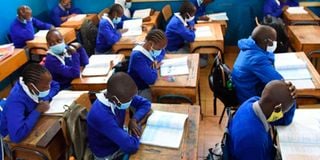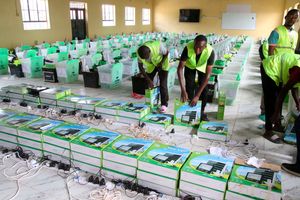Covid revealed magic of schools

Kilimani Primary School Grade 4 pupils studying in class in this picture taken on January 4, 2021 when schools reopened across the country.
What you need to know:
- A few days ago, there was a truly remarkable story about Serene Haven, a private school in Nyeri, central Kenya.
- Serene Haven opened its doors in January as Kenya’s first private school for pregnant teenagers and teen mothers.
As of the writing of this column on Tuesday evening, there were reports that the aeroplane carrying Kenya’s first Covid-19 vaccine batch “was on the way”. If all went to plan, the one million Oxford-AstraZeneca vaccines should be in town now and, with it, a path out of the pandemic nightmare will open for yet another country.
The combination of the extreme disruption caused by Covid-19, and the dramatic impact of the vaccine, will have far-reaching political, social and economic consequences. For one, the leaders who will emerge as Vaccine Providers In-Chief could amass a lot of power, and the Machiavellian ones can wield it with great effect as the ultimate patronage. And if they are leaving office, a successful Covid vaccination project can cement their legacy.
Still, that will be fleeting. We have to look elsewhere to see how the impact of the coronavirus will endure and alter society.
A few days ago, there was a truly remarkable story about Serene Haven, a private school in Nyeri, central Kenya. Serene Haven opened its doors in January as Kenya’s first private school for pregnant teenagers and teen mothers. There are a handful of such schools around the world but this is the first I could find online in Africa.
In a continent where education and societies are still quite conservative, and in most countries pregnant schoolgirls are expelled from school and even jailed — and disowned by parents — what Serene Haven has done is akin to the College of the Cardinals electing a woman to replace Pope Francis when he leaves office.
Radical as Serene Haven is, it has barely spat in the eye of a hurricane. In the first three months of the Covid lockdown last year, reports spoke of a 40 per cent rise in the number of teen pregnancies in the country, with 152,000 pregnancies. In that short period, there were nearly 4,000 schoolgirls reported to have become pregnant in the country, likely a conservative figure.
When the complete data for 2020 becomes available, it could be a shocker. The picture could be bleaker in neighbouring Tanzania and Uganda, which already have higher teenage pregnancy rates than Kenya.
Last August, World Vision projected that teenage pregnancy during the pandemic lockdown could block a million girls from returning to school in Sub-Saharan Africa. If nothing else then, the Covid-19 crisis and the cost of keeping children out of school tell us that we have to think very differently about education, yes, but particularly about school.
Mental health
Without the infrastructure of teachers, administrators, libraries, playground, friends, the company of peers, communal eating in cafeterias... many schoolgirls became vulnerable to gender-based violence, sexual exploitation, early marriage and, if they were poor, felt it more acutely. All over the world, being in lockdown and out of school for such long periods has wreaked havoc on children’s mental health.
My mother (bless her soul) used to tell us these things. She was always on about helping relatives to support their children through school. When she called, you could always expect at the end of the phone call when she said “and one more thing” that education for someone would come up. And she did a good job of it.
One time she recommended a few cases that we thought were hopeless, and we told her so. Her comeback was that we didn’t really understand what school is about. “Children go to school to grow up first and, secondly, to study,” she said. Even the one who fails school grows up better.
It has taken 20 years, and the pandemic, for me to finally fully appreciate what she was on about. Now we know that teachers are supra parents of sorts; that they and school administrators are counsellors keeping our children sane; that learning institutions are great protectors of girls, and an even bigger social-organising tool than we thought we knew.
We have to do something about it. For starters, throw more money at it — and in teachers’ pockets. It is necessary to begin seeing school not as something that closes after 5pm and on the weekend but as being socially part of the communities where they are located. A place that, beyond education, is something between a YMCA/YWCA, social centre and Boy/Girl Scouts — a new community outreach. And to make it work, of course, again, it needs more money and imagination.
We live not too far from a school. When schools reopened, I drove past screaming and rowdy pupils as they left at the end of the day. I slowed down to a crawl. It had been long, and I realised I had missed the sound. And there, for the first time after many months of pandemic fear and misery, I felt a sense of hope. They could scream all they liked; it would still have been music to the ears. The school children were what the men and women of the cloth would call a sign. And their worn-out school buildings were no longer an eyesore.
Mr Onyango-Obbo is a journalist, writer and curator of the Wall of Great Africans. @cobbo3





